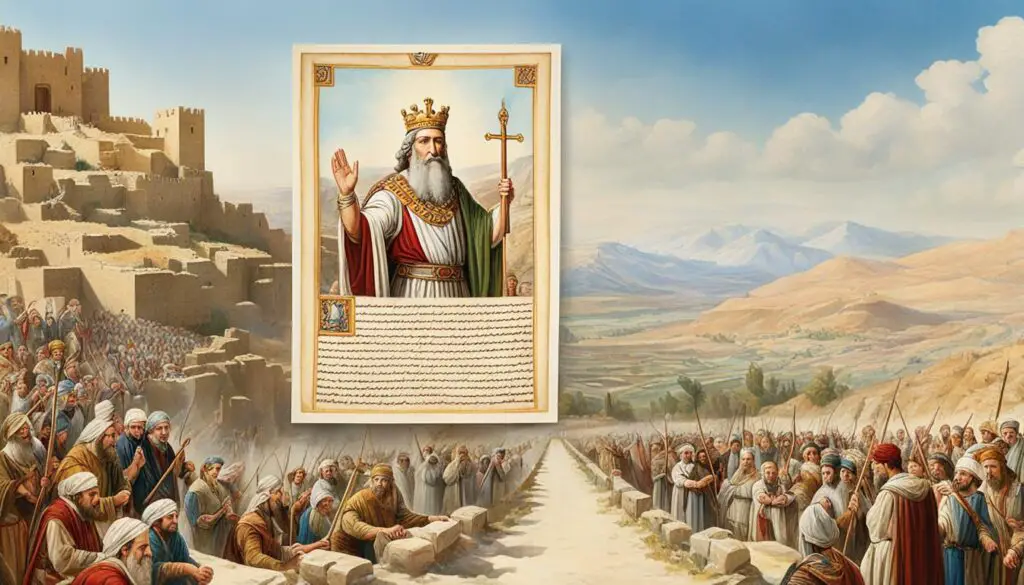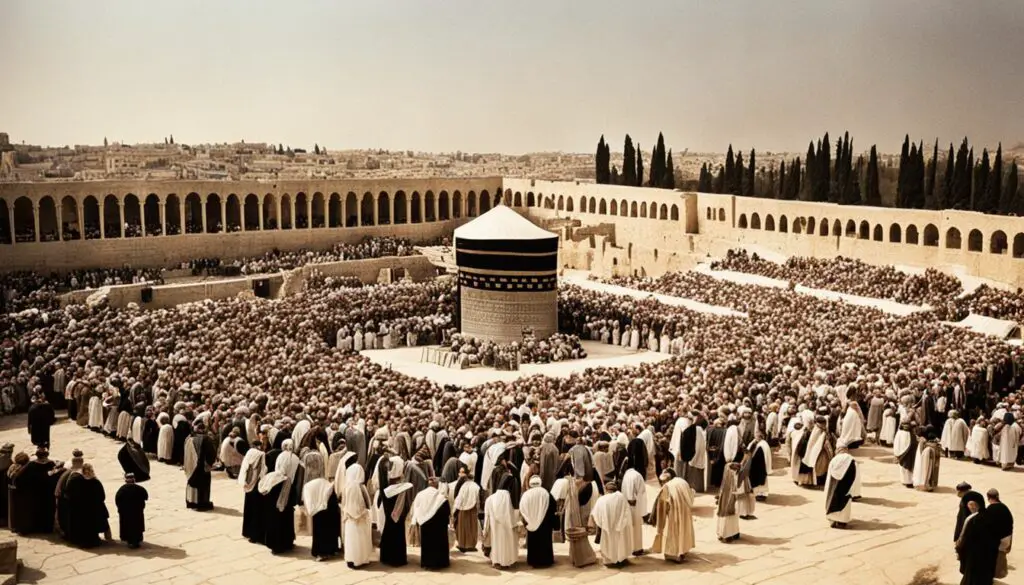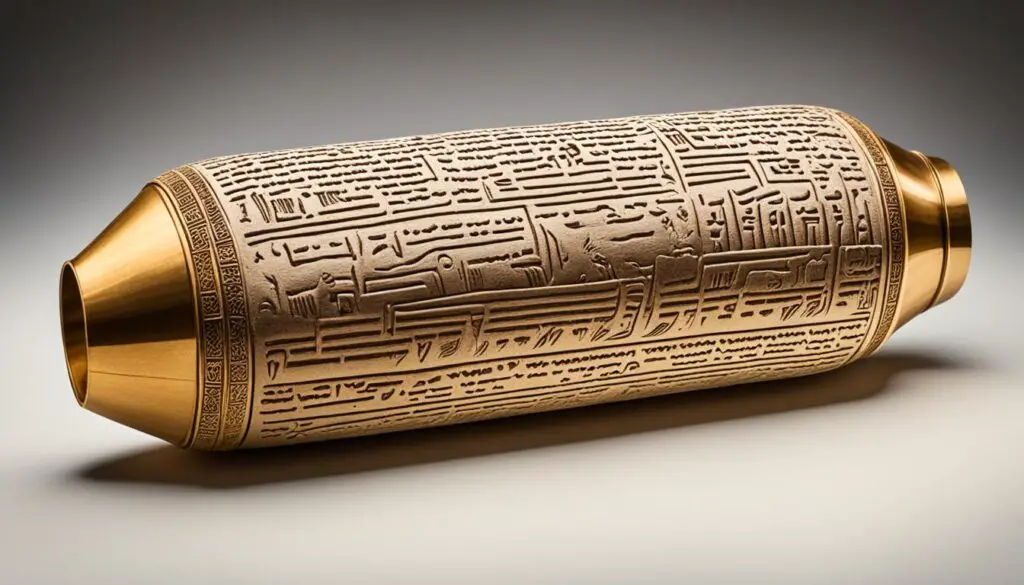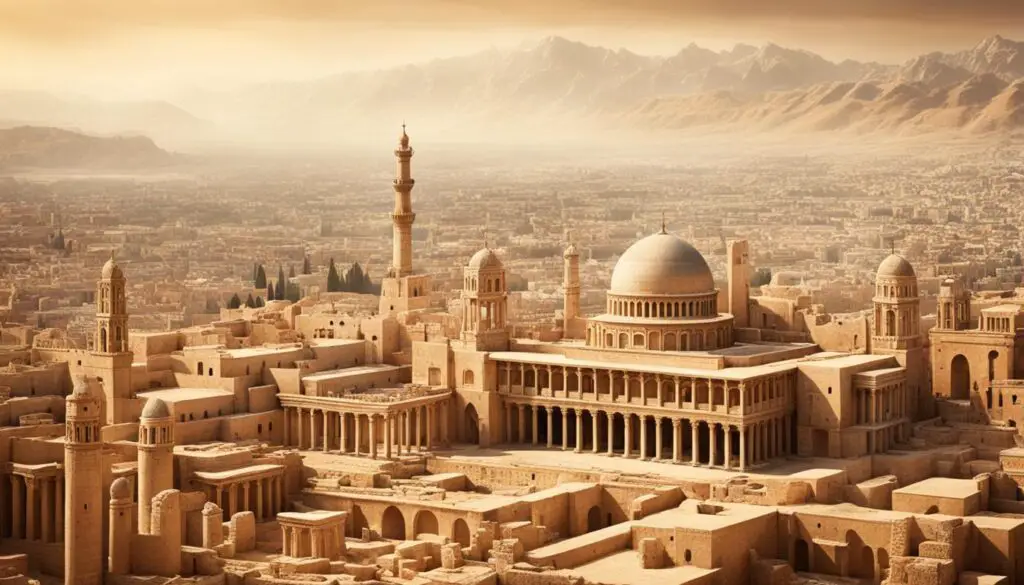Cyrus the Great, also known as Cyrus II of Persia, holds a significant place in both history and the Bible. As the founder of the first Persian Empire in 559 BC, he was a conqueror of great magnitude, expanding his empire by conquering the Median Empire, the Lydian Empire, and the Neo-Babylonian Empire during his illustrious 30-year reign. But it is Cyrus’s benevolent rule and his impact on Jewish history that make him an intriguing figure to explore.
In the Old Testament, the Bible records Cyrus’s noteworthy actions towards the Jewish exiles. He allowed the exiled Jews to return to Jerusalem and even encouraged them to rebuild the temple that had been destroyed. This act of benevolence is a testament to Cyrus’s fair and just rule.
The Cyrus prophecy in the Book of Isaiah further establishes his significance in Jewish history. The prophecy predicted Cyrus’s role as the King of Persia and how he would carry out God’s will by allowing the Jews to return to Jerusalem.
Key Takeaways
- King Cyrus, also known as Cyrus the Great, founded the first Persian Empire and was a skilled conqueror.
- Cyrus’s benevolent rule allowed the Jewish exiles to return to Jerusalem and rebuild their temple.
- The Cyrus prophecy in the Book of Isaiah highlights his role in Jewish history.
- Cyrus’s legacy extends beyond the Bible and encompasses his contribution to multiculturalism and religious freedom.
- His impact on ancient history and influence on subsequent civilizations solidify his place in history.
The Life and Reign of Cyrus the Great
Cyrus the Great, an ancient conqueror, lived from around 600 BC to 530 BC and is celebrated for founding the first Persian Empire. His reign was marked by remarkable military conquests, expanding the empire’s influence across vast territories.
Ascending to power by revolting against his grandfather, the King of the Medes, Cyrus displayed exceptional military prowess. He successfully conquered several mighty empires, including the Median Empire, the Lydian Empire, and the Neo-Babylonian Empire. These conquests not only increased the size of the Persian Empire but also solidified Cyrus’s reputation as a skilled conqueror.
Throughout his reign, Cyrus held various titles, including King of Anshan, King of Media, King of Babylon, and King of Kings. However, his true and enduring legacy lies in his ability to establish a peaceful transfer of power. Rather than imposing his own culture or eradicating the cultures of the conquered nations, Cyrus allowed vassals to maintain their positions and preserved cultural diversity within his empire.
Cyrus the Great’s enlightened approach to governance set him apart from other conquerors of his time. His commitment to inclusivity and cultural tolerance continues to inspire admiration and respect.
Cyrus’s Benevolent Rule and the Jewish Exiles
One of Cyrus’s most notable acts of benevolence was his decree allowing the Jewish exiles to return to Jerusalem and rebuild their temple. After the Babylonian captivity, where the Jews were taken captive by King Nebuchadnezzar, Cyrus conquered Babylon and issued an edict that granted the Jewish exiles the right to return to their homeland. This decree not only allowed the Jews to rebuild their temple but also protected their religious and cultural rights. It marked the end of the Babylonian exile and was a pivotal moment in Jewish history.
The Bible mentions Cyrus in multiple books, including Isaiah, Ezra, 2 Chronicles, and Daniel, highlighting his role in the Jewish return to Jerusalem.

The Return to Jerusalem and the Rebuilding of the Temple
After being held in captivity in Babylon for several years, the Jewish exiles celebrated the opportunity to return to their homeland. The decree issued by Cyrus allowed them to rebuild their temple, which had been destroyed during the Babylonian conquest. This event holds profound significance in Jewish history as it signaled a new chapter of hope and cultural restoration.
Protection of Religious and Cultural Rights
Cyrus’s decree went beyond granting permission to return to Jerusalem. It also protected the religious and cultural rights of the Jewish exiles. This act of tolerance and respect for diverse traditions ensured that the returned Jewish community could freely practice their religion without persecution or suppression.
“Thus says Cyrus king of Persia: The Lord, the God of heaven, has given me all the kingdoms of the earth, and he has charged me to build him a house at Jerusalem, which is in Judah. Whoever is among you of all his people, may his God be with him, and let him go up to Jerusalem, which is in Judah, and rebuild the house of the Lord, the God of Israel—he is the God who is in Jerusalem.”
– Ezra 1:2-3 (ESV)
These words from the Book of Ezra capture the magnitude of Cyrus’s decree and the opportunity it provided to the Jewish exiles. It is a testament to the benevolence and religious freedom granted by Cyrus.
The return to Jerusalem and the rebuilding of the temple marked a significant turning point for the Jewish people, reaffirming their connection to their faith and homeland. It was a moment of restoration and revival, both spiritually and culturally.
The Role of Cyrus in Jewish History
The role of Cyrus in Jewish history cannot be overstated. His decree and support for the Jewish exiles’ return to Jerusalem paved the way for the revitalization of Jewish religious and cultural practices. This pivotal moment allowed the Jewish community to reestablish their presence in Jerusalem and reclaim their identity.
Cyrus’s benevolence and recognition of the rights of the Jewish people have made him a revered figure in Jewish history. Today, his legacy is still celebrated as a testament to the power of tolerance and religious freedom.
“For thus says the Lord, who created the heavens (he is God!), who formed the earth and made it (he established it; he did not create it empty, he formed it to be inhabited!): ‘I am the Lord, and there is no other. I did not speak in secret, in a land of darkness; I did not say to the offspring of Jacob, “Seek me in vain.” I the Lord speak the truth; I declare what is right.'”
– Isaiah 45:18-19 (ESV)
These words from the Book of Isaiah acknowledge the divine providence behind Cyrus’s actions. It highlights the significance of Cyrus’s role as a tool in fulfilling God’s plan for the restoration of the Jewish people.
Cyrus the Great’s Influence on Jewish Religion
Cyrus’s decree had a profound impact on Jewish religion. The Jews were in despair during their captivity in Babylon, longing for their homeland and the chance to practice their faith freely. When Cyrus conquered Babylon, he issued an edict that allowed the Jewish exiles to return to Jerusalem and rebuild their beloved Temple that had been destroyed by the Babylonians. This momentous event marked the end of the Babylonian captivity and paved the way for the resurgence of Jewish cultural practices.

The reconstruction of the Temple of Jerusalem was an important milestone in Jewish history. It not only provided a physical space for worship but also symbolized the restoration of Jewish identity and religious heritage. The Temple played a central role in Jewish religious practices, serving as a place of sacrifice, prayer, and community gathering.
“And all they that were about them strengthened their hands with vessels of silver, with gold, with goods, and with beasts, and with precious things.” – Ezra 1:6
The Jewish community celebrated Cyrus as a savior, recognizing his pivotal role in their history and religious beliefs. His act of allowing the Jews to practice their religion freely emphasized his commitment to religious freedom and tolerance. Cyrus’s benevolence not only reinstated Jewish cultural practices but also served as a testament to his inclusive and fair leadership.
The Influence of the Temple Reconstruction
The reconstruction of the Temple in Jerusalem had a profound impact on Jewish religious practices. With the restoration of the Temple, the Jewish people were able to resume the sacrificial rituals and religious ceremonies that had been suppressed during their time in Babylon. These practices played a fundamental role in their spiritual life, connecting them to their ancestors and reinforcing their sense of identity as a chosen people.
Furthermore, the Temple served as a focal point for Jewish cultural practices, providing a central location for religious festivals, pilgrimages, and communal gatherings. It was a place of unity, where the Jewish community could come together to worship, celebrate, and seek spiritual guidance.
| Key Aspects of Jewish Cultural Practices | Description |
|---|---|
| Sacrificial Offerings | The offering of animals, grain, and wine as a means of worship and seeking divine favor. |
| Annual Festivals | Celebrations such as Passover, Sukkot, and Yom Kippur, marking important events in Jewish history and spiritual renewal. |
| Pilgrimages to Jerusalem | Jews from different regions would travel to Jerusalem to participate in religious rituals and connect with the divine. |
| Study of the Torah | The sacred text of Judaism, encompassing religious laws, moral principles, and historical narratives. |
A Lasting Legacy
Cyrus the Great’s influence on Jewish religion cannot be overstated. His decree and the subsequent reconstruction of the Temple marked a turning point in Jewish history, revitalizing the faith and reaffirming the importance of religious and cultural identity. The Jewish people continued to make significant contributions to the world, guided by their religious beliefs and cultural practices.
Today, the Temple’s destruction and subsequent rebuilding remain significant events in Jewish religious and cultural memory. They serve as a reminder of the resilience and determination of the Jewish people and the impact of benevolent rulers like Cyrus the Great on the preservation of religious freedoms and cultural practices.
Cyrus the Great’s Legacy and Impact on Cultures
Cyrus the Great’s impact goes beyond Jewish history. The Cyrus Cylinder, discovered in Babylon, is considered by some as the world’s first human rights charter. This significant artifact documents Cyrus’s policies and reflects his unwavering commitment to tolerance, religious freedom, and multiculturalism.
“I returned the images of the gods, which had resided there [in Babylon], to their places and I let them dwell in eternal abodes…”
The Cyrus Cylinder reveals Cyrus’s progressive ideals, including his efforts to restore religious artifacts and promote the practice of diverse cultural traditions within his empire. These policies highlight his recognition of the importance of preserving and respecting the customs and beliefs of conquered communities. The Cylinder serves as a testament to Cyrus’s groundbreaking approach to governance and his vision for a harmonious and inclusive society.

Even today, Cyrus the Great is celebrated as a model of benevolent and tolerant leadership in various cultures. His influence can be seen in historical records, such as the writings of Greek historian Xenophon, who praised Cyrus’s fair treatment of conquered peoples. Additionally, America’s founding father, Thomas Jefferson, admired Cyrus for his principles of religious freedom and tolerance. Cyrus’s legacy stands as a testament to the enduring power of his ideas and his impact on the development of ethical and inclusive societies.
Cyrus in the Context of Ancient Near Eastern History
To understand the significance of Cyrus in biblical history, it is essential to consider the context of the ancient Near East. The region was inhabited by powerful empires, such as the Assyrian Empire and the Medes, before Cyrus founded the Achaemenid Empire.
Cyrus’s conquests reshaped the political and cultural landscape of the region, establishing the Persian Empire as a dominant force. Unlike other rulers of the time, Cyrus showed remarkable leadership and tolerance towards conquered nations, allowing them to retain their traditions and rights. His unique approach set him apart and made him synonymous with benevolent rule and multiculturalism.

Ancient Empires in the Near East
| Empire | Capital | Time Period |
|---|---|---|
| Assyrian Empire | Nineveh | 934 BC – 609 BC |
| Median Empire | Ecbatana | 678 BC – 550 BC |
| Achaemenid Empire | Persepolis | 550 BC – 330 BC |
“Cyrus’s impact on ancient history is significant, and his name is synonymous with benevolent rule and multiculturalism.”
Cyrus’s influence is evident in the historical records of the time. His conquests not only expanded the Persian Empire but also shaped the development of the ancient world. The Achaemenid Empire became a melting pot of cultures, where diverse traditions and religions coexisted. This multicultural approach fostered innovation, trade, and artistic exchange.
Furthermore, Cyrus’s legacy extended beyond his lifetime. His policies of religious freedom, tolerance, and respect for conquered nations formed the foundation for future Persian rulers. His progressive ideals were immortalized in the Cyrus Cylinder, often referred to as the world’s first human rights charter. This artifact, discovered in Babylon, reflects Cyrus’s commitment to promoting diversity and protecting the rights of his subjects.
Overall, Cyrus’s rule in the ancient Near East marked a significant turning point in history. His leadership and inclusive approach set an example for future empires and continue to inspire admiration and study today.
Conclusion
King Cyrus’s legacy in the Bible and ancient history is undeniable. As a Persian King and ancient conqueror, he founded one of the greatest empires of the ancient world. His reign was characterized by a remarkable level of tolerance and benevolence towards his conquered subjects.
In Jewish history, King Cyrus played a pivotal role in allowing the return of the exiled Jews and the rebuilding of the Temple. This significant act cemented his place in biblical narratives and solidified his reputation as a compassionate ruler. His influence extended beyond the Jewish community, impacting diverse cultures through his progressive policies.
From the famous Cyrus Cylinder, considered the world’s first human rights charter, to modern-day celebrations of his legacy, King Cyrus the Great’s contributions to history and the Bible continue to be remembered and revered. His name is synonymous with a visionary leader who championed religious freedom, tolerance, and multiculturalism. King Cyrus remains an influential figure, leaving a lasting impact on both ancient and contemporary societies.







